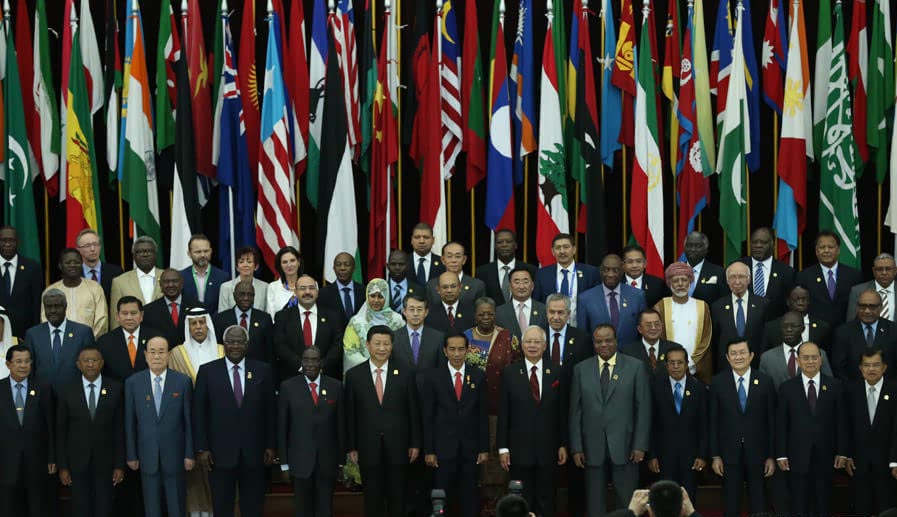The Asian African Summit opened on April 22nd in Jakarta, Indonesia, kicking off commemoration of the 60th anniversary of the historic Bandung Conference, the first large-scale gathering of independence-seeking Asian and African countries. Chinese President Xi Jinping delivered a speech at the meeting, during which he announced new measures China is taking to boost cooperation between the two continents.
Sixty years ago, representatives from 29 Asian and African countries gathered in Bandung, West Java, to discuss issues vital to their countries’ development in a meeting without participation of Western powers for the first time. Held against the backdrop of the Third World countries struggling for de-colonization and national liberation, the Bandung Conference marked a milestone in the history of Asian and African unity and cooperation and demonstrated the bolstered egos of those nations which had won independence after World War II. The Asian and African countries’ solidarity and common will to fight against colonialism, strive for national independence, safeguard world peace and promote friendly relations among themselves as demonstrated in the Bandung Conference was later summarized as “Bandung Spirit.”
The Bandung Spirit was epitomized by the “Ten Principles” announced in the Conference’s communiqué, which inherited and developed the “Five Principles for Peaceful Co-existence” jointly proposed by China, India and Burma in 1954. The Five Principles are “mutual respect of territorial integrity and sovereignty, mutual non-aggression, non-interference in each other internal affairs, equality and mutual benefit, and peaceful co-existence.” Both the Ten Principles and Five Principles were pioneering undertakings unparalleled in the history of international relations. They have become standards in international relations and principles of international laws. They helped protect the interests of developing countries and contributed greatly to the creation of a new international order that upholds fairness and justice.
The Bandung Spirit represented the collective awakening of Asian and African developing countries to the importance of unity in their struggles for independence and development. It is still of practical significance for today’s world.
The Bandung Spirit can help Asian and African countries meet new challenges and opportunities.
Asian and African countries are faced with three major opportunities. First, the rise of developing countries and new economic communities in Asia and Africa has exerted a strong impact upon the global geopolitical landscape. Asian and African countries make up more than half of the United Nations members. In 2014, the total economic volume of the two continents was $29 trillion, or 37.5 percent of the world’s total, representing a 47-time growth over that of 1970. The two continents have become major engines propelling the growth of the world economy.
Second, multilateral cooperation is becoming popular among Asian and African countries with greatly increased exchanges and establishment of more and more regional and inter-regional cooperative mechanisms.
Third, China put forward the pioneering “One Belt, One Road” initiatives, which have received enthusiastic responses.
The new challenges come in four aspects. First, the Western powers use “democracy” and the Internet to interfere in Asian and African affairs by exploiting the internal contradictions in the two regions. Their moves are jeopardizing the regions’ peace, stability and development. The United States has adopted an “Asia-Pacific rebalance” strategy to create confusion in the region in a bid to besiege China. Meanwhile, Japan is stubbornly turning right. Tokyo repeatedly denied crimes the country committed in World War II and stepped up moves to seek the status of a political and military power.
Second, hotspot conflicts keep flaring up in Asia and Africa while land and marine territorial disputes escalate. Out of speculative purposes, Western powers intervened in the disputes with covert partiality, triggering arms races in certain part of the region and creating troubled waters in the South China Sea.
Third, terrorism and religious extremism have become rampant in the world while sectarian conflicts have intensified, severely harming Asia-Africa’s safety and stability. Fourth, climate change, population inflation, natural disasters, and pandemics have added up to serious threats to Asian and African people’s lives and property.
In the face of the challenges and opportunities, the Asian and African countries should carry forward the Bandung Spirit of “solidarity, friendship and cooperation” to jointly promote their continents’ peaceful development.
China has been carrying forward and enhancing the Bandung Spirit.
At a meeting marking the sixtieth anniversary of the Five Principles of Peaceful Co-existence on June 28, 2014, President Xi delivered a speech calling for continuation of the principles and joint efforts to build a better world. In the speech he suggested “six persistences,” namely persisting in sovereignty equality; persisting in common security; persisting in joint development; persisting in cooperation for common benefit; persisting in inclusiveness and mutual learning; and persisting in fairness and justice.
Premier Li Keqiang also expressed his understanding of the Bandung Spirit at the 54th annual session of the Asian African Legal Consultative Organization. In his speech delivered at the opening ceremony on April 13, Li put forward “five suggestions.” They are: work for a fairer and more reasonable international political order; make the global economy more open and run in a more orderly way; safeguard international and regional peace and stability; unite to meet non-traditional safety challenges; take active moves to deepen international legal exchanges and cooperation.
With the 60th anniversary of the Bandung Conference as a favorable opportunity, China will further promote the “One Belt, One Road” initiatives, Asia-Africa exchanges and preparation of the Asia Infrastructure Investment Bank so as to enhance unity and mutual support among Asian and African countries for their peaceful development and a fairer and more reasonable international order.



